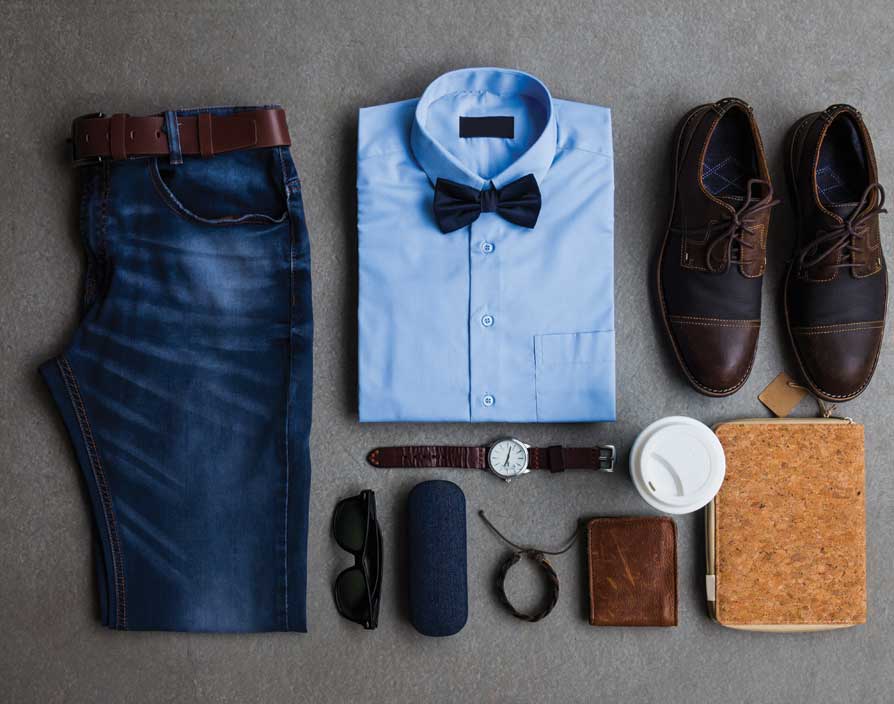When financial analyst Michael Pachter, sporting a wonky tie, questioned Facebook founder Mark Zuckerberg’s decision to wear a hoodie to an IPO meeting on Wall Street, it seemed to represent a clashing of two worlds. One was in favour of showing respect by donning what has for decades been the accepted workplace outfit: the business suit. The other comprises a disruptive group of entrepreneurs who take pride in wearing what makes them most comfortable, even if they’re attending one of the most significant meetings of their career. From Snapchat co-founder Evan Spiegel’s penchant for white trainers to the late Steve Jobs’ trademark black polo necks, entrepreneurs are embracing a more casual look that speaks to a counterculture that’s seen tech geeks come to rule the world.
Wearing a suit and tie used to be de rigueur for men. But thanks to Zuckerberg, Spiegel et al. the rules are changing and the casual look has spread out from isolated pockets in Silicon Valley and London’s Tech City to offices across Britain. The entrepreneur uniform most often spotted at coworking spaces, hackathons and startup HQs is jeans, some form of smart jacket and either a shirt or t-shirt. Helen Venables, managing director at House of Colour, the image consultancy franchise, puts this down to the democratisation of business success. “There’s been a seismic shift away from the very formal look and this is almost certainly due to the rise of digital entrepreneurs who are proving that having a great concept has nothing to do with the clothes you wear,” she says.
Venables could easily have been talking about Zak Patel, O2 franchisee and managing director of Denham the Jeanmaker, a clothing company. He favours the casual look and didn’t even put a suit on for a recent meeting at Downing Street. “I hate the idea that you have to wear a suit to a meeting,” he says. “Personally, I’d like to see the suit die.”
With the rise of flexible and remote working, office culture has become less formal and structured, which is invariably making dress codes harder to interpret. For example, the entire concept of dress-down Friday is looking increasingly irrelevant. “A lot of guys would wear the same thing – like jeans and a shirt or t-shirt – on weekends and during the week now,” says Luke McDonald, stylist at Thread, the online personal styling service for men. “People now wear whatever they feel comfortable in. That certainly wouldn’t have been true a generation ago.”
Patel recalls an initial meeting he had with Jason Denham, the stylish founder of the company he now licences. “When he first saw me, Jason said ‘I was expecting a guy in a suit’,” he says. “I guess it was because I had a background in telecoms.” And the entrepreneur believes that Denham might well have been less keen to do business with him if he had dressed up too much.
Dave Mortensen, co-founder of Anytime Fitness, the gym franchise, isn’t quite as ready to judge suit-wearers. “I wouldn’t say that just because you wear a suit you’re small-minded,” he says. “It really depends on the industry you’re in. That being said, I very rarely wear a suit unless the occasion is very formal.”
But while the suit may be in decline in some circles, many franchisors appear reluctant to give it up entirely. The Business Doctors, the business consultancy, favours a smart dress code – within reason. “We encourage people to wear navy blue suits and white shirts but have a no-tie policy,” says Lynne Rawlinson, the company’s brand manger. “We feel this makes us appear smart but less corporate and this is an approach that’s spearheaded by our franchisors Rod Davies and Matt Levington.”
But what do the stylists make of the state of franchisor fashion? Venables thinks there’s work to be done. “There can be a tendency in the franchise industry to play it safe and wear very traditional suits and white shirts,” she says. “But this can sometimes come across as being too formal.”
McDonald’s verdict is even more damning. “Generally speaking, franchisors seem to be a little behind in terms of what people wear in the workplace,” he says. “They’ve tried to adopt a more smart casual look but in many instances it actually just looks like they’ve put on a suit and then removed the jacket and tie.”
That being said, the casual dress code doesn’t give you a licence to be sloppy. “I draw the line at flip flops,” Mortensen says. Robinson agrees and feels particularly strongly that if you are dressing down, you need to get the basics right. “I wear expensive clothes that look very good,” he says. “Power dressing is about grooming: making sure what you wear is pressed, getting the right fit, styling your hair and having clean fingernails.”
So while the casual look may seem simpler, it’s actually very open to interpretation. And Venables points out that British men aren’t famous for their ability to find the right balance. “Generally speaking, Britain does smart better than anyone – think Savile Row tailoring – but casual often means something like jogging bottoms,” she says. “Britain’s franchise industry is still trying to work out how to master smart casual.”
Meanwhile, McDonald has some sage advice. “Shoes can be the downfall of many an outfit,” he says. “Avoid chisel toes, slip-ons or anything too sporty. A classic choice like a Derby or Oxford shoe always works. And avoid over-accessorising; you don’t need a pocket square, a watch and a bracelet.” The casual look certainly seems to have less margin for error.
Whatever side of the fence you’re on, it’s perhaps a little early to start mourning the end of the suit. One of the world’s most successful entrepreneurs, Elon Musk, is often pictured looking sharp in a suit or tux if the occasion calls for it. Even hoodie-loving Mark Zuckerberg has started wearing a suit and tie combo. Perhaps the trend could come full circle? Given that power dressing seems to have become about showing people you’re not just wealthy but that there’s something a little different about you, it’s conceivable that the suit could become an act of rebellion against the reign of denim. “The suit is definitely not dead,” McDonald concludes. “It’s a timeless classic that’s always evolved and adapted.” Sorry Zak but Savile Row’s tailors probably aren’t going to be quaking in their Oxford lace-ups or Derby shoes just yet. ![]()




































